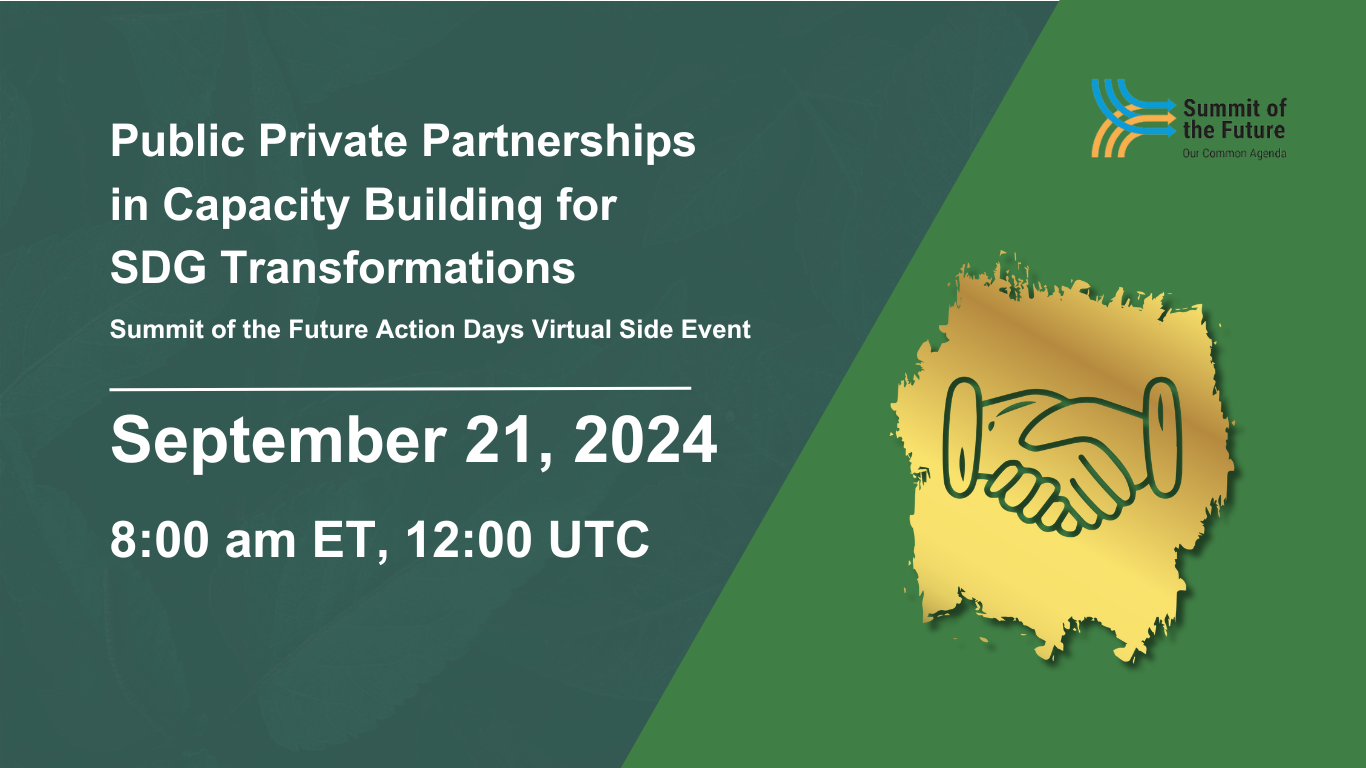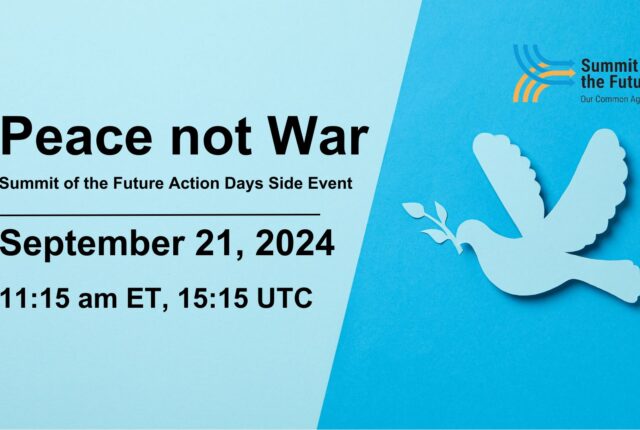This page was updated on September 24, 2024 to include a summary and recording of the event.


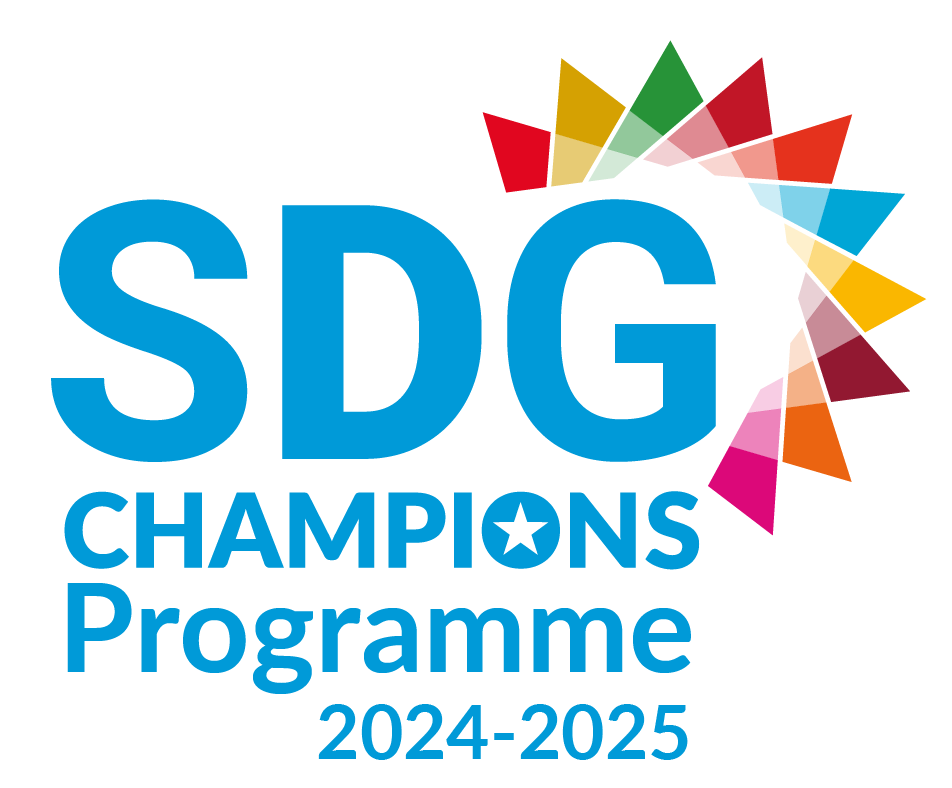

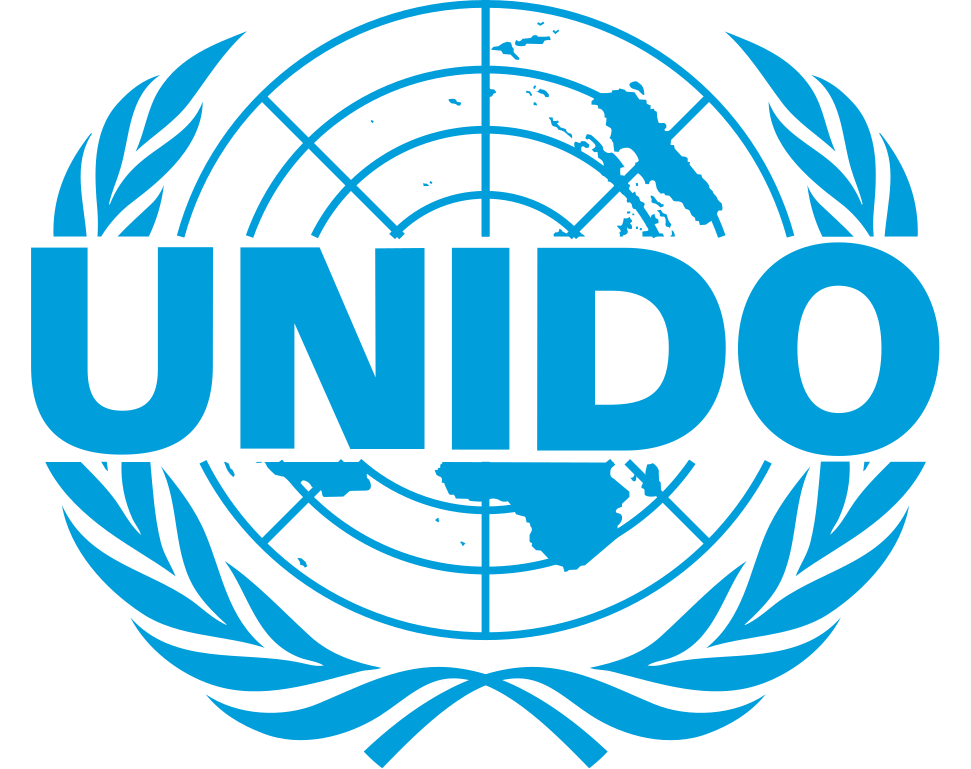

Reflections on the UN SOTF Action Days Side Event: “Public-Private Partnerships in Capacity Building for SDG Transformations”
Partnerships are essential to achieving the Sustainable Development Goals, as SDG 17 demonstrates. Nevertheless, the recently approved UN Pact for the Future only makes one reference to public-private partnerships (PPP). The full potential that PPPs have in driving sustainable development has yet to be recognized.
On September 21, 2024, during the UN Summit of the Future Action Days, stakeholders from academia, the private sector, and international organizations gathered to discuss the critical role of PPPs in advancing SDG goals through capacity building.
The online side event titled “Public-Private Partnerships in Capacity Building for SDG Transformations” took place during Ireland’s third Sustainable Development Goals (SDG) Week, happening from 20 – 29 September 2024. Ireland’s SDG Week 2024-2025 is part of the wider European Sustainable Development Week (ESDW), which happens from 18 September – 8 October 2024.
Event Summary
Initiatives for SDG Transformation
The discussion focused on advocating for upskilling and reskilling to adapt to the green and digital transitions, focusing on four main topics:
- The role of micro-credentials.
- Upskilling and reskilling Vocational Education and Training programs.
- Capacity building for small and medium enterprises (SMEs).
- The role of the private sector in SDG transformation, with a particular focus on the (re-)insurance sector.
The Role of Micro-Credentials
Professor Enda Murphy of University College Dublin discussed the discrepancy between workers’ skills and jobs requirements. A gap that is mainly brought by formal education’s slowness to adapt quickly its curricula to the skills needed today for the green and digital transitions.
In contrast to formal education, Murphy emphasized that micro-credentials can rapidly upskill and reskill professionals. Micro-credentials can also be more holistic in its approach, and address sustainability across the 17 SDGs.
A Master’s Pathways in Foundations of Sustainable Development program has been designed by UCD in partnership with the SDG Academy with the goal of providing students with the sustainability skills they will require in the workplace.
For more details, please refer to Professor Murphy’s presentation below.
Upskilling and Reskilling VET Programs: BuildSkills Academy’s Purpose
Isabela Carrozza Joia from the SDG Academy presented the BuildSkills Academy, a project co-sponsored by the European Commission, which aims to upskill and reskill the construction sector for the green and digital transitions. This sector is facing workforce shortages, while also needing to adapt quickly to new sustainability standards.
The BuildSkills Academy aims to support Vocational Education and Training (VET) programs by assessing their programs and proposing how to enrich it to include critical skills workers need. It also aims to create pan-European certification frameworks that can be used across EU Member States.
For more details, please refer to Isabela Carrozza Joia’s presentation below. And follow the BuildSkills Academy on Facebook and LinkedIn for further information.
Capacity Building through Multilateral Collaboration
Elena Proden, Senior Specialist at UNITAR, focused on capacity building for small and medium enterprises (SMEs), especially in developing economies. Most of the SMEs are lacking resources and expertise, making it difficult to navigate the green and digital transitions.
Proden introduced the Capabilities 4 the Future Hub, a joint initiative by UNIDO, UNITAR, and SDSN. This hub provides training and upskilling opportunities tailored to SMEs, enabling them to contribute to sustainability worldwide. “It’s about providing the tools and training SMEs need to thrive,” Proden explained. The initiative will be further explored at the upcoming 2024 Multilateral Industrial Policy Forum, on 23-24 October, in Riyadh, Saudi Arabia.
A Private Sector Perspective: the Role of (Re-)Insurance in Sustainable Development
Melissa Leitner, Global Head of Life and Health Sustainability at Swiss Re, and Fellow of the UK and South African actuarial professions, provided insights from the private sector’s perspective, as well as that of the actuarial profession, which is a critical source of skills supporting the insurance industry and wider financial services sector. She provided perspective on the role the (re-)insurance industry can play in the achievement of the SDGs, but yet how it is often under-recognized. Indeed, the word insurance is not mentioned one single time in the UN Pact for the Future, while the word risk was cited 50 times.
According to Leitner, “insurance helps the world to tolerate risk, and when risk can be tolerated, then it means that innovation and growth can be enabled more easily. Effectively, insurers and reinsurers act as shock absorbers for crises that happen, and we help the world to recover faster from shocks that may otherwise cause progress to reverse or decline.”
The upcoming SDSN position paper on “Sustainable Development and the Insurance Industry” (provisional title), research sponsored by Swiss Re and harnessing the views of diverse insurance leaders across the private and public sector, will focus on why insurance isn’t sufficiently on the SDG agenda, and what needs to be done to make it more prominent. Some recommendations already anticipated by Leitner are to:
- Address sustainable development beyond climate issues.
- Reframe the sustainable development agenda to focus on more positive outcomes around transformation, innovation and value creation.
- Adopt an approach that focuses on prevention rather than only reaction to shocks.
- The critical need for capacity building and upskilling on sustainable development.
The position paper is set to be published in the next few months.
Building a Future of Inclusive, Sustainable Development
The event closed with a call to action for collective efforts in capacity building and innovation. Professor Patrick Paul Walsh, Vice President of Education at the SDG Academy of the UN Sustainable Development Solutions Network (SDSN), highlighted the importance of collaboration in capacity building and training for achieving the sustainable development goals.
This event reflected the increasing importance of public-private partnerships in aligning education, industry, and policy to meet the evolving needs of the global labor market. As the world continues to strive towards the SDGs, these partnerships are vital in bridging the gap between policy ambitions and practical implementation.
Key Actions Launched:
- The Master’s Pathways in Foundations of Sustainable Development program by UCD in partnership with the SDG Academy,
- The BuildSkills Academy, for helping the construction sector to reskill and upskill to adapt to the green and digital transitions.
- Capabilities 4 the Future Hub, a joint initiative by UNIDO, UNITAR, and SDSN, to provide capacity-building programs for SMEs.
- SDSN position paper on “Sustainable Development and the Insurance Industry” (provisional title), to promote the role of insurance in achieving the sustainable development goals, sponsored by Swiss Re.
UN Summary
Click the arrows below to expand event details
Event Details
The UN SOTF 2024 Virtual Side Event, Public-Private Partnerships for SDG Training, explored the critical role of SDG capacity building through public-private partnerships in Science, Technology, Innovation, and Digital Cooperation across nations.
This event happened in the context of Ireland’s third Sustainable Development Goals (SDG) Week, which occurred from 20 – 29 September. Ireland’s SDG Week 2024-2025 formed part of the wider European Sustainable Development Week (ESDW), which ran from 18 September – 8 October 2024. This virtual side event was co-hosted by University College Dublin, a Government of Ireland SDG Champion, and SDG Academy the education initiative of UN Sustainable Development Solutions Network.
This event highlighted key initiatives that bring together the public and private sectors to foster innovation and build the necessary capacity for achieving Sustainable Development Goal transformations globally. The discussion aligned with the Pact for the Future, particularly focusing on Actions 5, 12, 30-36, and 57.
Date: Saturday – 21 September 2024 | Add to Google Calendar | Add to Outlook Calendar | ICS File
Time: 8:00-9:15 am ET | 12:00-1:15 pm UTC
Location: Online- Register on Zoom here
After registering, you will receive a confirmation email containing information about joining the meeting.
Hosts
Government of Ireland SDG Champion University College Dublin, BuildSkills Academy, SDG Academy, UNIDO, UNITAR, and Swiss Re
Objectives
- Identify the key areas where capacity building is most needed to accelerate progress towards SDG achievements.
- Explore how public-private partnerships can foster innovation and capacity building in Science, Technology, and Innovation.
- Showcase successful models and initiatives that demonstrate effective collaboration between the public and private sectors in building capacity for SDG transformations.
Key Questions
- What are the critical gaps in skills and capacity across various sectors that hinder progress towards achieving the SDGs?
- How can public-private partnerships be leveraged to bridge these gaps in capacity and foster sustainable industrial development?
- How can micro-credentials and certifications be integrated into capacity-building programs to ensure long-term impact and scalability?
- What are some successful examples of public-private cooperation in capacity building, in particular, what are some examples in sectors such as construction, manufacturing, and services?
Agenda
Opening
Speakers
EU BuildSkills Academy
-
- Isabela Carozza Joia, Program Associate, SDG Academy
Academic Micro Credentials
-
-
Enda Murphy, Professor School of Architecture, Planning and Environmental Policy, University College Dublin
-
Capabilities 4 the Future Hub in Multi-lateral Industrial Policy
-
- Elena Proden, Senior Specialist, Strategic Implementation of the 2030 Agenda Unit, UNITAR
SDSN Position Paper on (Re) Insurance Partnerships and the SDGs
-
-
Melissa Leitner, FIA FASSA, Head of Life & Health Sustainability, Swiss Re
-
Chair
Patrick Paul Walsh, Vice President of Education and Director, SDG Academy, UN Sustainable Development Solutions Network (SDSN)
Q&A & Closing
Speakers:
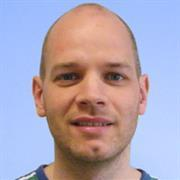
Enda Murphy Professor School of Architecture, Planning and Environmental Policy, University College Dublin
Enda is Professor of Planning at the School of Architecture, Planning and Environmental Policy where he has been programme Director for the Masters in Regional and Urban Planning (MRUP) since 2019. He is also a UCD academic lead for the Sustainability and Climate Committee of Una Europa. Between 2015-2018, he held the position of Vice-Principal for Graduate Studies and Director of the Graduate School for the College of Social Sciences and Law (CoSSL). Beyond the University, he is an active Editorial Board Member of PLOS ONE, one of the world’s leading science journals; he is also a current member of the UN SDSN SDG Academy High Level Advisory Council (HLAC) whose mission focuses on the international development of Education for Sustainable Development. His research interests are broad in scope but centre on the areas of urban transportation and spatial planning, environmental noise, neoliberalism/neoliberalisation, and the UN Sustainable Development Goals (SDGs). He has published widely in the international literature and is author/co-author of more than 100 academic journal papers, book chapters, conference papers and reports and is co-author of three books. Enda has held visiting professor positions at the University of Economics, Ho Chi Minh City, University of Hartford, USA, Cape Peninsula University of Technology, Cape Town, CRENoS, University of Cagliari, and at KTH Royal Institute of Technology, Stockholm. He is a former Fulbright Scholar.

Elena Proden, Senior Specialist, Strategic Implementation of the 2030 Agenda Unit, UNITAR
Elena Proden is a development economist with more than 15 years of experience working for the UN at country, global and regional levels on capacity building and applied research. She currently works as a Senior Specialist and Team Leader of the Strategic Implementation of the Agenda 2030 Unit at United Nations Institute for Training Research supporting countries on national planning and economic transformations, statistical production and dissemination, M&E, as well as higher education, TVET and academia engagement. She is also coordinating UNSDG:Learn partnership on UNITAR’s behalf to promote better learning opportunities for different stakeholders from policy-makers, statisticians, evaluators to businesses and CSOs.

Isabela Carrozza Joia, Program Associate, SDG Academy
Isabela is a Program Associate at the SDG Academy. She mainly supports the Academy for Transitional Skills in the built environment (BuildSkills Academy) project in its outreach. BuildSkills Academy is an EU training program aimed at upskilling workers in the construction sector in Europe.
Before joining SDSN, Isabela worked on sustainable development communication strategies at the OECD Development Communication Network, specializing in researching public perceptions and attitudes towards sustainable development. She holds a MSc in International Affairs from the Graduate Institute of Geneva (IHEID).
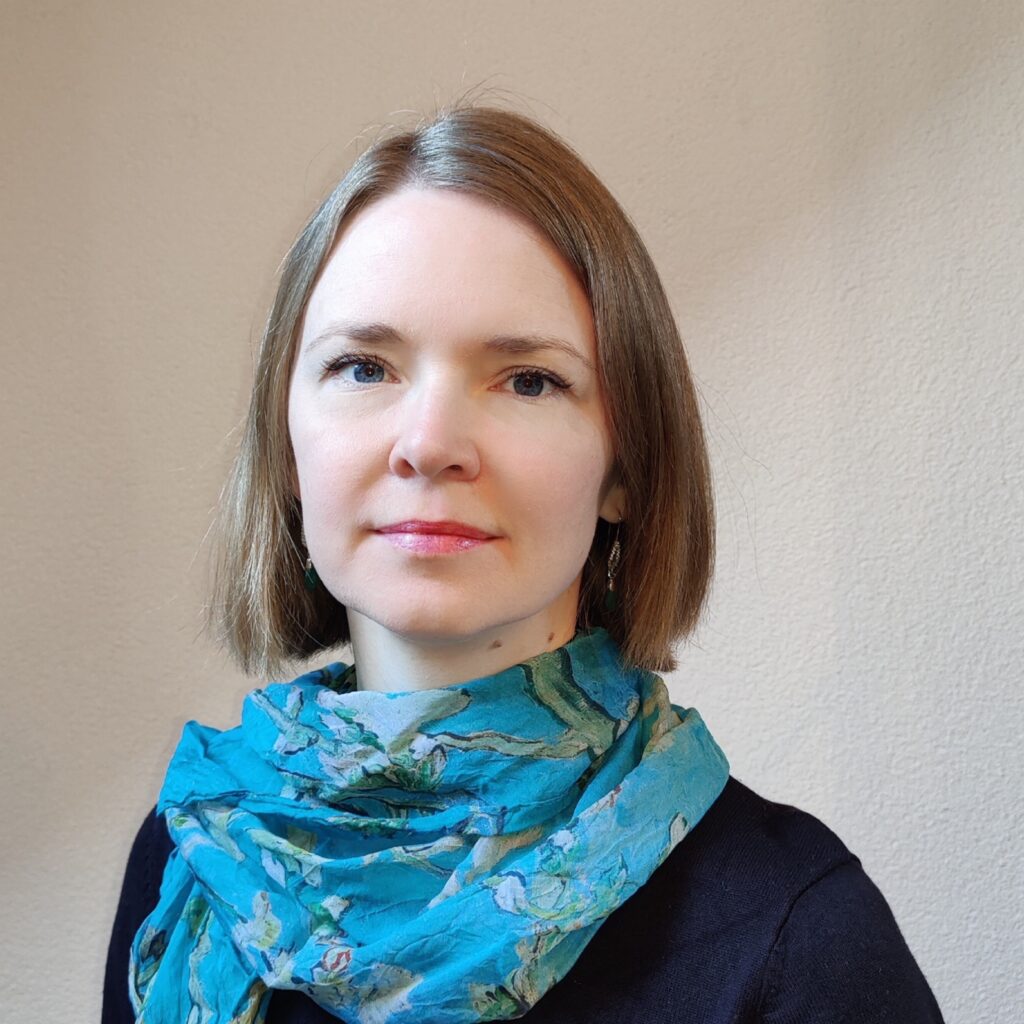
Melissa Leitner, FIA FASSA Head of Life & Health Sustainability, Swiss Re
Melissa Leitner has 20 years’ experience in the life & health insurance and reinsurance industry, across a wide geographical scope of international markets, and in roles covering insurance product development, pricing, innovation, business development, and most recently, sustainability. As Head of Sustainability for Swiss Re’s Life & Health Reinsurance business, she leads the development of a global growth strategy in inclusive insurance for Swiss Re and its insurer clients.
Melissa is a fellow of the Actuarial Society of South Africa, and a fellow of the Institute and Faculty of Actuaries in the UK. For the latter, she volunteers as a Board member for the Sustainability actuarial practice area, supporting actuaries to integrate the SDGs into their continuing professional development.
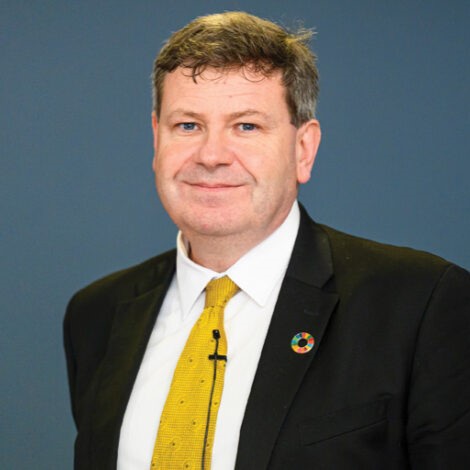
Patrick Paul Walsh, Vice President of Education and Director, SDG Academy, UN Sustainable Development Solutions Network (SDSN)
Patrick Paul Walsh received a Ph.D. in Economics from the London School of Economics in 1994. Dr. Walsh is a Government of Ireland, Marie Curie (Brussels), IZA (Bonn), RSA (London), EIIR (Brussels) and REPOA (Tanzania) fellow. He is currently on secondment to UN Sustainable Development Solutions Network (SDSN) as Vice President of Education and Director of the SDG Academy.
Dr. Walsh still remains a Full Professor of International Development Studies and is Director of the UCD M.Sc. in Sustainable Development in partnership with the SDG Academy. He was elected president of the Statistical and Social Inquiry Society of Ireland (SSISI) in 2022. SSISI is an all-island learned society established in 1847. The Society is a forum for evidence based discussions on public policy between government departments, social partners and academia. Proceedings are published in an open science diamond Journal archived in TCD TARA and listed on the Web of Science.
